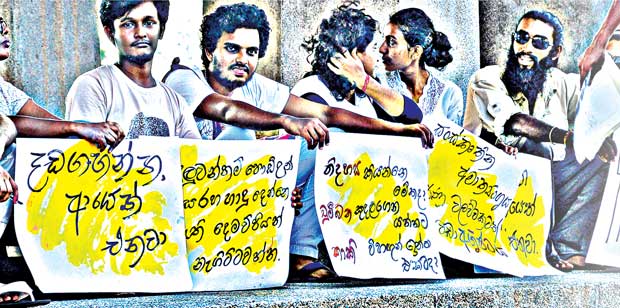Reply To:
Name - Reply Comment

 Although born and bred in the Island of Serendib, ‘Serendipity’ is a word I picked up from the New York ‘left’. It was on an afternoon in Cooper Square, in the famed and fabled East Village in lower Manhattan that I met Ryan.
Although born and bred in the Island of Serendib, ‘Serendipity’ is a word I picked up from the New York ‘left’. It was on an afternoon in Cooper Square, in the famed and fabled East Village in lower Manhattan that I met Ryan.
New York is a funny place. You could bump into a stranger and more often than not, find something in common. He was having lunch, and so was I, at the small ‘garden’ on the bend of *th Street, right opposite the Astor Place subway station. The area is called Cooper Square, owing to some building with a similar name. Union Square is a few hundred metres from where we were. Ryan tells me that he is an adjunct Professor, a poet and social activist.
Curiosity got the better of me. I had to know what the term ‘social activist’ meant to a 29-year-old New Yorker. I prodded him on.
“You see New York is filled with people who love life. They love people too. But they don’t know what to do with all this love,” he said. I didn’t quite understand what he meant by ‘love’. It’s a word that can connote many emotions, and is often subjective. “ People are very passionate about what they do. They want to help. They see an issue with the system,” he explained, seeing my reaction.
This was a narrowing down I could deal with. But I wanted to know more.
“So how do they express this love?” I asked. “That’s a bit of a tricky question. Some rant and rave online, some try and make donations to whatever cause they want to, others drop in a dollar or two when they see the homeless, and some others gather at Union Square and protest every once in awhile,” he said matter-of-factly.
New York has over 60,000 beggars. ‘Homeless’ is the term used in this part of the world. On many street corners of Manhattan you find people holding banners. “Homeless and hungry, anything will help,” is one that strikes.
“But have they helped solve the problem”? I looked directly at him and asked. “No. Of course not. The number of homeless people has risen, racism is clearly on the rise, and the women, and the LGBTs, they continue to suffer on the streets and in the workplace,” the white, blue eyed boy explained. Ryan was the embodiment of ‘Satan’ as Elijah Muhammad would describe to Malcolm X, while tutoring him on Islam -- white, scruffy blonde hair, six feet tall replete with blue eyes and a stubble that isn’t detailed.
Women passing by gazed at him for more than a few seconds, some turned around more than once.
I wasn’t quite sure how to react to what he said. I knew Donald Trump had supporters here in New York, but for the most part New Yorkers are an empathetic lot. And most Trump supporters are enraged with the system, although not entirely empathetic to those trapped in it.
Ryan continued. “You see these people think that they are doing some good. They are, but they often miss the wood for the trees.” I wanted some clarification, and he didn’t hesitate. “ Many help out of a sense of guilt. Why do we live in such comfort while the rest suffer, is a question that eats into their soul. Some find solace in religion. Some in donation, and some in holding placards at Union Square. Most of the time their actions overlap and interchange,” he explained.
Concerned with the thinning down of the demography, the journalist in me narrowed the conversation down to the protests. It was a selfish strategy. But if there was a story here, how was I to track the rest? At least the protesters were visible. They were public.
“So then, what about the protests? Do they do any good?” I asked, trying to sound nonchalant. “ Of course they do. Attention is drawn. If you’re lucky, New York 1 would cover it and a newspaper would pick the story up and everyone passing Union Square would see the protest, wouldn’t they?” Ryan said. I couldn’t disagree.
And with that a million other questions ran through my mind. I think he understood my perplexed look. I assume he sensed my confusion was drawn from his “missing the woods for the trees” remark.
“You see my man, people can have all the love in the world, but if they don’t understand or are ignorant enough to ignore addressing issues which are inherently systemic, then the issues are going to remain, or even escalate. Exactly like we see right now,” he said, leaning towards me. I tried to find passion in his eyes, but there was none to be found.
He continued. “The thing is. you won’t find many of them trying to address what women here face day in and day out. Everyday, all day”. Why, I asked, and he didn’t bat an eyelid. “ Because it doesn’t affect them or the cozy lives they live”,
I tried drawing parallels, but my mind drew a blank.
Still, something was amiss. To me at least. “But they are still doing something. There can’t be anything wrong with that can there?” I asked.
“Yes they are, but as soon as their problem is addressed, which normally is straight away because these are wealthy people, they get back to their merry making at Mcsorleys,” he said. The ‘Mcsorleys Ale Pub’ is one of New York’s oldest pubs found smack in the middle of East Village. Since 1864 it has been a haven for the East Villager and has stood through all the social phases that New York has gone through.
I understood what he was getting at, but pretended not to, and kept silent. That’s the remarkable thing about conversation. Silence is unwelcome, and someone will inevitably find the need to break it.
“They fail to think that the people face these issues every day, on the subway, at McDonalds, at the convenience store, and on the sidewalks. Once their issue is addressed, its ‘thank you’ and ‘good-bye’,” he said, filling the silence.
I strained again to make comparison, but my memory failed me.
There was something in me, which wanted to add that Colombo’s East Village protester- the Coffee Shop Liberal- were the polar opposite of those who turn up at Union Square. But I kept silent.
Ryan continued, providing a precursor to the next few minutes of conversation. .“The Union Square protesters don’t know that people in Harlem face the same issues each and every single day, and the ones in Harlem are at a loss to understand how and why those at Union Square are upset- the issues they are upset over seem mundane to the ones in Harlem” This was beginning to sound too rhetorical, and so I tried to shoot him down. “Specifics Ryan, This sounds like a politician spelling out policy,” I smirked. That got him thinking. Oh, I forgot to mention that he wore glasses. Thin, long frame-less ones. He removed them and placed them on the side of the table we were seated at.
“So let me give you one example. New York has a large Hispanic community and South Asian community. One speaks Spanish, and the other speaks around 10 other languages. But I know that the Bangladeshis are the worst affected of the lot. How do I know this? Because you could walk through Queens and see the conditions they work in,” he explained.
“I learnt Spanish and Bengali. I spent about a year studying both and now I can even read and understand poetry in both languages. It naturally helps me connect with and understand people from these communities better,” he spelt out.
These words suddenly hit me comparisons I had failed to make moments earlier.
Ryan continued to talk, but I wasn’t listening any more. My thoughts had wandered from East Village to the East. I thought of Sri Lanka and of Colombo. I thought about how fortunate we were. I didn’t know if I should interrupt and tell him that Colombo’s coffee shop liberals, my parallel to the East Village protesters, not only knew impeccable English and were handy with western cutlery, but actually knew the languages of the ‘common man’.
Was I to tell him that all of them, our Coffee Shop liberals, read Sinhala novels, listened to Sinhala songs and were fans of Sinhala poetry? Or that their rich knowledge of Tamil allowed them to understand the woes of the Northerner and Up-country workers within half-an-hour of conversation? I also wanted to tell him that far from being disconnected from the average Sri Lankan, like New York’s East villagers were according to him, they were representatives of the common man.I felt like telling him that our coffee shoppers didn’t need to put all the effort he seemed to have put in. There was also something in me, that wanted to tell him that many of the coffee shoppers knew how important language was, in understanding the average Sri Lankan. But I kept mum.
By now Ryan had moved onto Trump, and was saying something about ‘bigots’ and ‘calling out’ a movement and about the need for such assumption. I wanted to interrupt him, and tell him about Colombo. But I held back, only because I didn’t want to go on a rant, when he was willing to do the honours instead.
I don’t remember much else thereon of what he said except the pupils of his blue eyes, large and shining, looking at me and looking away as if on cue each time he wanted me to listen. I laughed. There was little reason to cry and no bluff to be called out.